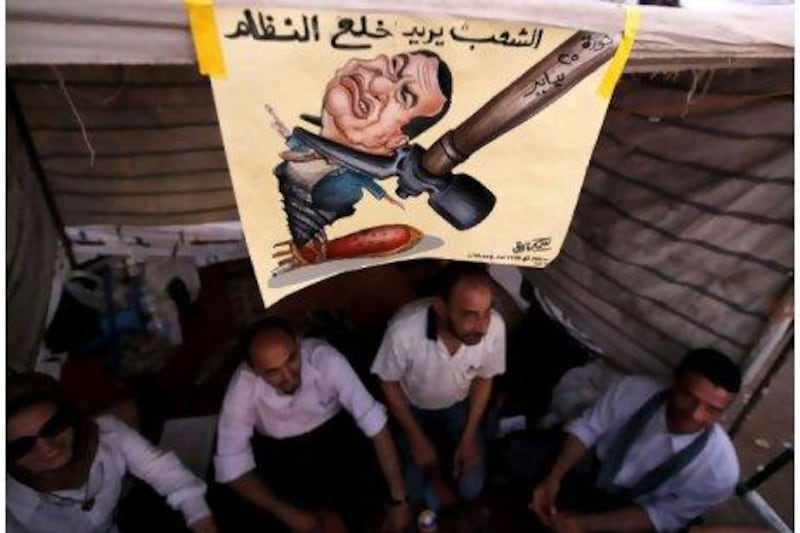CAIRO // Hosni Mubarak has told interrogators he did not order security forces to open fire on protesters during the 18-day uprising that saw him removed from power him, according to a leaked transcript of his interrogation that was published yesterday.
The former Egyptian president also insisted that no one would have listened to him had he ordered a stop to the violence, which killed nearly 900 protesters, and he suggested that both the security forces and the demonstrators fired on each other during the January 25-February 11 uprising.
Mr Mubarak, 83, also denied corruption allegations, while seeking to explain why a bank account in his name held millions of dollars in foreign donations intended for the construction and upkeep of a massive library in Alexandria.
He said he had secretly kept the money from the library's management so they could not claim it or use it for purposes not related to the facility.
The transcript of Mr Mubarak's questioning by prosecutors was published by two independent newspapers, Al Youm al Sabea and Al Dustour.
Judicial officials said the transcript was authentic.
Mr Mubarak's chief defence lawyer, Farid El Deeb, said part of what was published had been fabricated, but declined to elaborate.
Mr Mubarak remains under police custody at a hospital in a Red Sea resort. He faces trial next month on charges of ordering the use of deadly force against the demonstrations, which gripped the country this year.
He is also facing charges of corruption along with his two sons, Alaa, a businessman, and Gamal, his one-time heir apparent.
Mr Mubarak has already been convicted of damaging Egypt's economy when he shut down telecommunications services during the protests. He was fined the equivalent of Dh121.1 million.
Justice for the uprising's victims is among the hottest issues in Egypt during its bumpy transition towards democracy.
Protesters have been camping out at a central Cairo square, and in other cities across the country, since last week to demand that those behind the killings be swiftly tried.
The interior minister, Mansour El Issawi, fired nearly 700 senior police officers on Wednesday to cleanse the deeply unpopular force, but protesters remained unsatisfied, arguing that a complete restructuring of the force is needed.
In their entirety, Mr Mubarak's comments appeared designed to fend off charges that he ordered, knew of or condoned the use of deadly force against protesters. The comments also paint a picture of a leader kept in the dark by top aides as to the gravity of the situation during the uprising.
He also appeared to grossly underestimate the number of protesters out on the streets in Cairo and across much of the nation during the uprising and, at one point, was dismissive of the violence and the resulting loss of life. "Our people and our security are like that," he said.
Asked to explain why he thought protesters were killed and wounded during the uprising, Mr Mubarak said: "I cannot say exactly."
He later added that there was chaos, with the security forces and the protesters attacking each other.
"No one would have paid any attention to me or my orders," he replied when asked why he did not stop the violence.





